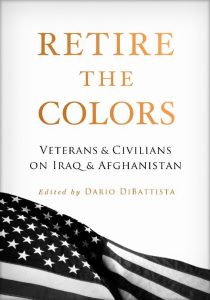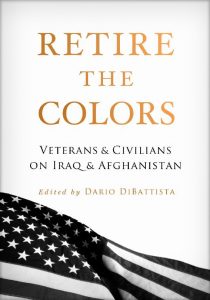by Andria Williams (Navy)
I recently received an advance copy of an anthology called Retire the Colors: Veterans & Civilians on Iraq & Afghanistan, and was excited to see several familiar names within its pages. I knew these writers to be talented and insightful folks, but even so, I was impressed by the power of this taut, heartfelt collection.

Retire the Colors is composed of nineteen essays by veterans and civilians connected to the recent wars. The contributors, eight women and eleven men (impressively balanced for a book about war!) range widely, from service members who saw combat and experienced violence firsthand, to service members who deployed but didn’t. One young woman writes about a former boyfriend who served in one of the hardest-hit units in Iraq. Another civilian, having observed her grandfather’s untreated PTSD from WWII, finds herself concerned with veteran trauma, and she eventually starts up art therapy sessions for veterans.
All of these writers have been affected by war, and as they casually reference the various people in their lives (“my mom”… “my best friend…” “my three daughters…”) it’s easy to see the ripple effect of trauma and violence. They describe their memories of wartime returning to them, in forms that might pass right by other people but which hit them with an iron force: a smell (singed deer hide from a hunting trip), a song (“Carolina in My Mind,” played by the Mortuary Affairs team while they worked on the bodies), a sight (a suspicious-looking object in the road, which turns out to be a duck).
There’s something about rooting such memories in the objects and influences of American life that, I think, could do about as much for bridging the veteran-civilian divide as anything else we’ve thought of yet. Maybe eighty percent of our civilian experience overlaps with veterans’: going to the movies, grabbing take-out from Chipotle, watching, I don’t know, Batman Returns — like some kind of cultural Venn Diagram. But in that other twenty percent lies the mystery of what veterans have experienced and the rest of us have not.
Even veterans feel guilt about the pain they haven’t personally experienced. In her beautiful essay “Echoes, Boston” –a gem of a piece written in the second person– Air Force veteran Lauren Halloran describes her emotions after the bombing at the Boston Marathon. In describing her level of survivor guilt, trying to find the source of its intensity, she could be speaking for any civilian:
The sadness bores deeper. Then you scold yourself for being selfish. This tragedy didn’t happen to you. You are unharmed, and there’s nothing you can do. That’s when you understand the feeling in your stomach: helplessness.
—
At the height of the recent wars, stories and images of soldiers focused on the immediacy of their experience: I can easily call to mind photos I saw of fire teams in full battle rattle, straight out of Call of Duty; or in portrait, somberly holding a pair of blood-stained boots, with sun and strain in their eyes; or passing candy into the outstretched hands of local children. Those were moving, foreign, in-the-moment images, and they served a certain purpose. This is what you sent us to. This is what’s happening now.
But as Ron Capps points out in the foreword, the essays in Retire the Colors are about the aftermath, the homecoming. There’s more introspection than there is adrenaline or profanity, and there is no voyeuristic thrill of war. There is a distinct and refreshing lack of what Peter Molin of “Time Now” calls “grillin’, chillin’, and killin'” (the celebration of SPECOPS-level bravado occasionally interrupted by green-tinted manhunts under cover of darkness).
The writers of these essays are real people, grappling with something they took part in, or which changed someone they love. These essays couldn’t have been written in the “during.” They had to come after, with some distance.
And that’s important, because, as several of the writers point out, no one can really think when they’re going house-to-house in Fallujah, or putting a twenty-year-old’s remains in a plastic bag as “Carolina in My Mind” plays. Or covering their childrens’ heads with a blanket as shells rain down around their home, destroying their country, as Tahani Alsandook describes in “Heavy Steps.”
As Dario DiBattista describes it:
If your time at war is a chapter in your life, well, while you’re living it, there’d be nothing to write. You’d simply be a pen hovering above a page with no time to make sense of anything or to reflect.
Or, as Brian Castner writes in “The Peace of May Labors”:
When you go to war and pluck an apple from its tree and take that forbidden bite, a bomb of Andy Warhol-type hyper-color detonates and drenches every bullet and Humvee and thwacking helo like a purple-lipsticked Mao. This brilliant vibrancy binds you to the minute but steals every tomorrow.
Most of the writers seem to have reached a place of, if not “peace,” some kind of insight or balance. Their essays, carefully crafted and deeply thoughtful, sometimes intellectualized, seem to suggest this. Of course these are only synopses of the past ten or thirteen years, or only snippets.
Just one essay, Joseph R. Bawden’s “It’s Nothing (Singed),” struck me as still having that deeply “in the thick of it” feel. This makes it stand out slightly, and heightens both its own power and the power of the essays surrounding it.
It feels like I don’t really say much of anything. It feels like sometimes the way you feel is so clear and urgent and real inside you and you are just bursting to get it out, and then you do and you feel like you haven’t explained yourself well enough….
There are some guys who are really torn up about what we did and what we saw. I’m not one of them. I don’t know what sort of person can see all of those things and not be torn up about it, or what sort of person that makes me.
—
Reading this collection of essays, I found that they built upon one another to create a slow burn. I identified with these writers from military culture: people with smart mouths and quick wits, people who like to work out and to run (as many military folks I know do), people who could marvel at the surreal lifestyle they’d become part of even as they dreaded losing their identity away from it.
I understood Colin Halloran, in “Private. Pupil. Professor,” writing that he sometimes feels his students and colleagues in the Ivory Tower judge him for his military service, that they don’t know quite what to do with him, that they consider him conservative even though he doesn’t think of himself that way at all. I, too, often feel like a rubber ball bouncing back and forth between my liberal ideals and my knee-jerk defensiveness of anything having to do with service members and the military. “Leave my family alone!,” I want to say. In the same breath I can mentally dress-down some hawkish politician on TV while I simultaneously want to give a piece of my mind to the armchair liberal on Facebook congratulating himself for always having been on the right side of history. It’s an impossible, futile chasm to navigate, and it can get exhausting.
I was moved almost to tears by Matthew Hefti’s account of his time since leaving the military, having returned to his family and friends. In his inimitable style (his essay is called, “Something on Something That’s Something Like Disillusionment”), he writes:
I’ve been given a gift. A great and undeserved gift. But I still find myself missing it all. I need to kick myself in the ass sometimes because there’s more life and more emotion and more complexity to be grasped in the rolling ball of three little girls on the living room floor of a townhome in Wisconsin than there ever will be in the open expanse of desert where young men try to get their kicks. I constantly need to remind myself of that which I know to be true, that which bears repeating: I am home. I’ve been given a gift. A great and undeserved gift.
Retire the Colors is a surprising gift of a book, a gift of generosity from writers who are truly trying to understand the folks around them and to help you understand them, too. If only we all worked towards a dialogue this way, we’d be a kinder and better nation. Retire the Colors is exactly what we need, and I’ll be recommending it to everyone I know.
——
DiBattista, Dario. Retire the Colors: Veterans & Civilians on Iraq & Afghanistan. Hudson Whitman/Excelsior College Press, 2016.
Buy Retire the Colors here !

Thank you for your analysis and recommendation. What a compelling collection for deep insight into a complex situation and experience for so many of our family, friends, and neighbors.
LikeLiked by 1 person
Thanks for reading, Nancy! It’s a great collection of essays. These are the takes on our recent wars I’d like people to hear.
LikeLike